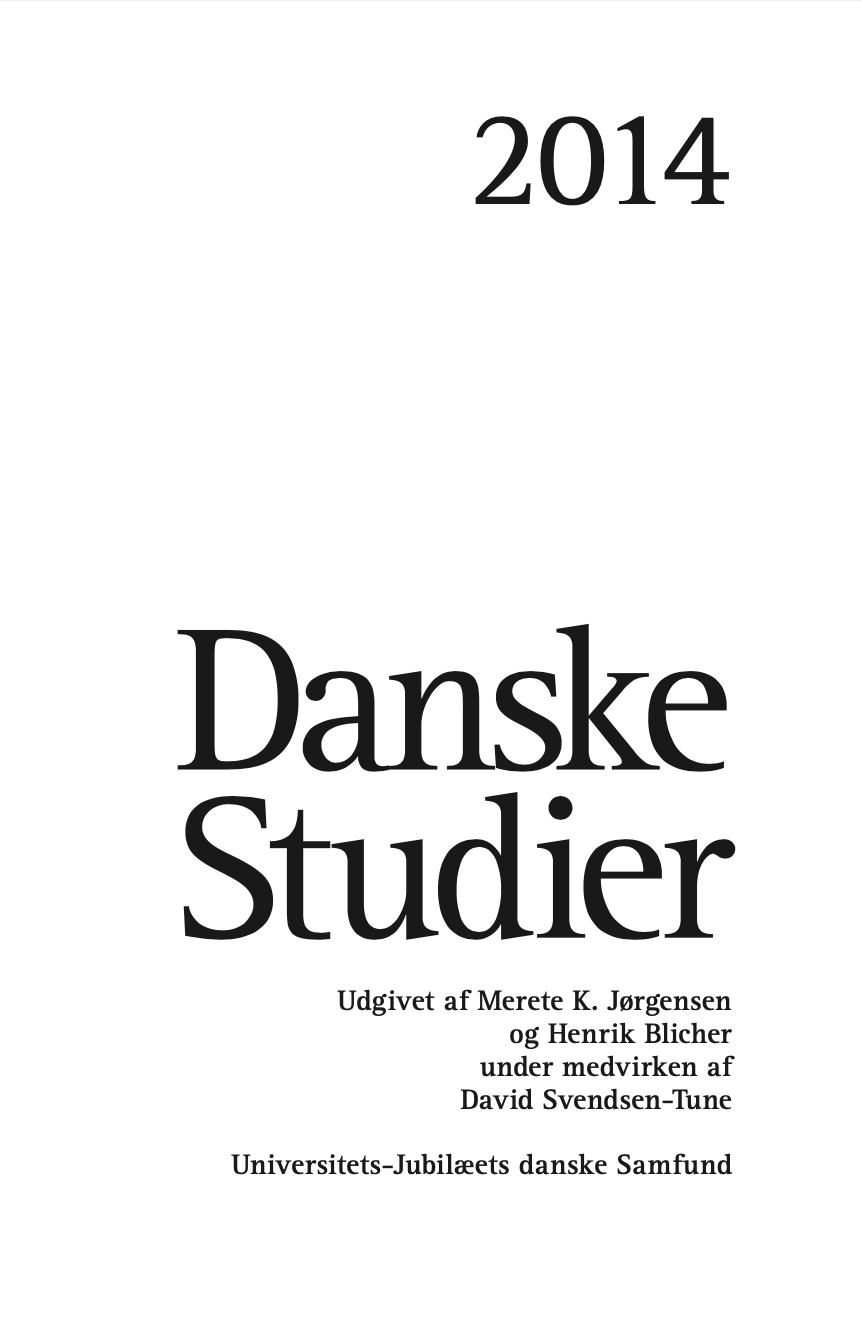Ewalds Felix culpa
Abstract
In an alexandrine verse drama, Adam og Ewa (1769), a “felix culpa” rendering of the Fall, its plot culminating in a heavenly display of golden letters of John 3:16 as well as showcasing other very notable features in common with the so-called Simultaneous Theater of the Middle Ages, Danish Johannes Ewald (1743-81) presents a further unique, ultracosmic perspective. In a strikingly original interpretation of the Fall, Ewald lets his readers understand that Adam is a first appearance of the Saviour figure, in his freely chosen Fall accepting his own death out of love for Ewa, thereby apparently causing radical change in Heaven and he himself quoting Jesus’ last words on the cross in his reply to God’s calling him forth after the Fall: “Where art thou?” – “In thy hands” (Gen 3:9 with Luke 23:46). Man, a carrier of God’s All-Goodness.
References
Adam og Ewa citeres efter nedenstående udgave af Ewalds samlede skrifter, bd. 1 (1914 og 1967), med angivelse af udgavens side-, og efter skråstreg / dens linjetælling. – Stykkets regiangivelser gengives i kursiv. Der henvises til prisafhandlingen om stykket (1960/2011) ved sidetal (uden foransat s.) med bind-tallet 1, 2 eller 3 foransat; ved sidetal (med foransat pag.) når der citeres af bedømmelsen 1961, som er aftrykt med forlæggets egne sidetal i afhandlingens bd. 3.
Bibelen. Den hellige Skrifts kanoniske Bøger. Det Danske Bibelselskab. København 1992.
Brockhaus. Die Enzyklopädie in 24 Bänden. Mannheim 1997.
Christensen, Erik M.: Ewalds Adam og Ewa (1769) og verdenslitteratur. Prisopgave Aarhus Universitet 1959-60. Besvarelse 1960 scannet og trykt 2011 med Bedømmelse 1961 ved Professorerne Gustav Albeck, Sven Møller Kristensen, Paul Krüger 1-3. Odense 2011.
Id.: En fortolkning af »Høit fra Træets grønne Top«. Verifikationsproblemet ved litteraturvidenskabelig meningsanalyse belyst i praksis. København 1969.
Id.: Verifikationsproblemet ved litteraturvidenskabelig meningsanalyse. Odense 1971. (disputats)
Elbek, Jørgen (anm.): Værdig til nåden. Johannes Ewalds debut nærlæst og perspektiveret, i: Standart. Anmeldelser af ny litteratur, 25. årg., nr. 4, s. 72, Århus december 2011.
Ewald, Enewald: Den Bibelske Concordantzes Første Deel. København 1748.
Ewald, Johannes: Adam og Ewa / eller / Den Ulykkelige Prøve, / Et dramatisk Stykke / i fem Handlinger med Mellem-Sange, / af / Johannes Ewald, / S.S.T.C./(...)/ København 1769.
Id.: Johannes Ewalds samtlige Skrifter 1-4. København 1780-91.
Id.: Johannes Ewalds samlede Skrifter efter Tryk og Haandskrifter. Udgivne af Det danske Sprog- og Litteraturselskab 1-6. København 1914-24. – 2. udgave, med et tillæg i bd. 6. København 1967.
Jessen, Mads Sohl (anm.): Erik M. Christensen: Ewalds Adam og Ewa (1769) og Verdenslitteratur, i: Danske Studier 2013, s. 214-217. København.
Jewish Study Bible, The. Jewish Publication Society Tanakh Translation. Oxford 1999.
Kirkconnell, Watson: The Celestial Cycle. The Theme of Paradise Lost in World Literature with Translations of the Major Analogues. Toronto 1952.
SOED = New Shorter Oxford English Dictionary on Historical Principles 1-2 1993. Sixth Edition. Oxford 2007.
Pagels, Elaine: Adam, Eve, and the Serpent. London 1988.
Rubow, Paul V.: »Johannes Ewald« og »Kundskabens Træ«, i id.: Tendenser. Nye litterære Betragtninger, s. 61-71 og 214-20. København 1944.
Værge, Johannes: Guds skrøbelige arvinger. En bog om menneskets fald og fuldendelse. København 2014.
Wikipedia, the free encyclopedia (www.wikipedia.org – English), art. »felix culpa« læst marts 2014.
Downloads
Published
How to Cite
Issue
Section
License

This work is licensed under a Creative Commons Attribution-NonCommercial-ShareAlike 4.0 International License.
Artikler offentliggjort fra 1/1 2021 er omfattet af CC BY-NC-ND-Licens.
Artikler publiceret i Danske Studier før 1/1 2021 er underlagt dansk ophavsret. Det betyder at man må citere, downloade og linke til dem via tidsskrift.dk. Genudgivelse af artiklerne kræver en aftale med redaktionen som også ejer ophavsretten.





